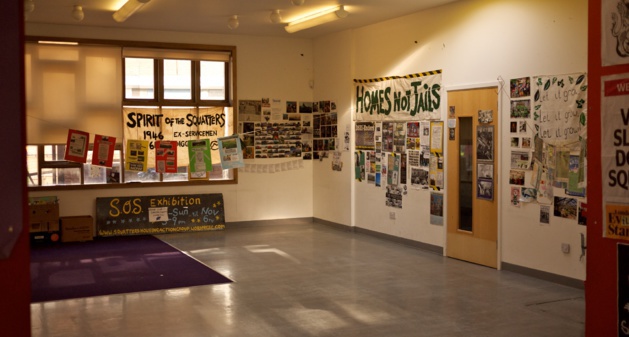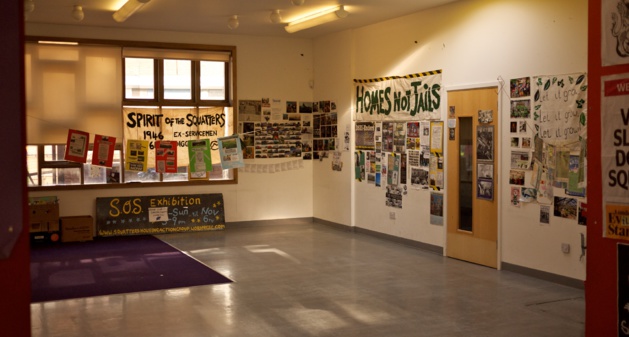
Crédit london.indymedia.org/
What is a squatter? It is a person, who occupies an empty or abandoned building without the permission of the owner. This social class does not go over 30 years old and reunite some varied profiles. The squat is one of the consequences of the housing crisis, which plunges England into persisting tensions. This phenomenon evolved in the 90s and is taking today a troubling extent in London. A poll of the Guardian revealed the dysfunction of the real estate market in London with 710 000 deserted edifices through England in 2014. Several properties are now at risk to be abandoned, which will be followed by an economical stagnancy with negative impacts on the local communities and on the national real estate developments activities.
A popular practice
SQUASH (Squatting Action for Secure Homes) is an association, which fights for squatter rights. This organization points out that the number of people waiting for housing has almost doubled since 1997. In order to fight this phenomenon SQUASH scrambles to assign a proper housing to people in needs.
The squat practice has always existed in the history of the United Kingdom, and especially during the 60s and 70s. At that time, this trend was caused by the liberation of morals and the will of developing a new life style.
Far from prejudices, the squat does not only reunite homeless but also young working people, students and foreign people who cannot follow the “life style” way of London.
At one of those meetings, Le Journal International met Sophie, a young German girl. She is in London to gain experience and learn English. In general, squatters prefer to stay anonymous for safety reasons, but after a discussion with Sophie, she wanted to defend and tell me more about this practice. In that way, she reveals her journey and her first steps on the British soil: “I’m 18 years old, and I am currently in a placement year. I’m doing an unpaid internship, which is the case of most trainings in England. However, I did not expect that the life here would be that expensive, and despite the help of my parents I cannot afford to live comfortably.” Sophie heard of this system through online housing researches. This solution turn out to be cheaper and reunite other young people, which enables her to meet new people.
Sophie tells us that she even heard of “squatting party”. “Those parties are taking place in houses, which are occupied by squatters. The only problem here is that we have to be respectful, because if we make any wrong move, the police forces can remove us and take the house.” Indeed, brutalities actions are highly prohibited in the squatting practice. Since 1977 the use of threats and violent practices in order to take over a property in which someone is living and put up to the infiltration is illegal. The law was introduced in order to protect the owners and to avoid expulsion jugged as too inhuman. That is what is often referred to when we speak of “squatting rights”.
Le Journal International participated at one of those monthly gatherings to analyze this practice. The mediator of the meeting is a formal French expatriate squatter, who rent now an apartment but he is still fighting for people, who are stalled. In a first phase, he explains the squat laws. Corollary, the admission in a property is allowed only if this one is open and unoccupied. During the infiltration in the building, squatters change the bolt. Once they are inside, the individual use of electricity, gas and internet is preferred to stay in the legality and to avoid in that way any problems with the police authorities. Causing severe damage and use the energy fraudulently are the only reclaimable uses. However, the presence of a person in the building is indispensable to prove that the house is occupied.
Once the domicile is “squatted”, public forces and the owners do not have the right to get into the building anymore. Sophie, our young German girl, does not share her experience with her parents, who may get worrying. She affirms, ”I know there is no risk. The idea of squatting has simply a very bad reputation. Most of the squatters are people I can trust, with a professional life or student life. I don’t intend to squat with strangers, meetings are here for this: create new groups.”
Like that squatters live in the anonymity, fearing the expulsion and because of the new law, which criminalize even more this social group.
Between legality and illegality?
Today, the State officially recognizes the squat. In that way, the owner of squatted houses have to go in the District Court in order to prove that the occupiers entered illegally into their property before being evacuated.
The squat was recently jeopardized by the “nonresidential law” legislation, which was expressed by the Conservative Union of the Tories. The right-wing made this phenomenon public, and scared the citizens in the process. Securities services were set up, causing a growing fear in London housing. Owners call on an assistance called “Guardian services” to insure protection against potential intruders.
The last law put into effect changes the game a little bit. It allows to accelerate the expulsion process of the squatters in unoccupied residential holiday homes, like for example second home or even domains for sales. Police forces is now allowed to search a building, which is suspected to be occupied by squatters and to remove them of the place.
According to the Justice Minister “No longer will there be so-called 'squatters rights'. Entering a property with the intention of squatting will be a criminal offence.” However, the squatters, who occupy nonresidential houses are still able to claim their rights. The squat of a residential building is considered as an infraction and is punishable by a maximum prison term of up to six months, a £5000 (maximum) fine or both.
This news provokes discontentment from organizations like SQUASH and other initiatives were taken since the new legislation. The occupation of housing remains legal but is becoming a source of growing insecurity. A petition and pacific actions just like artistic exhibition and concerts were set up by SQUASH in order to maintain the feeling of stability for those homeless people. The Guardian is supporting the organization. The newspaper acclaims the organization through a letter, which pleads the removal of the legislation. SQUASH invite all of the concerned people to mobilize through donation, or suggests to invest in the different activities of the group, which can be followed on their website.




























